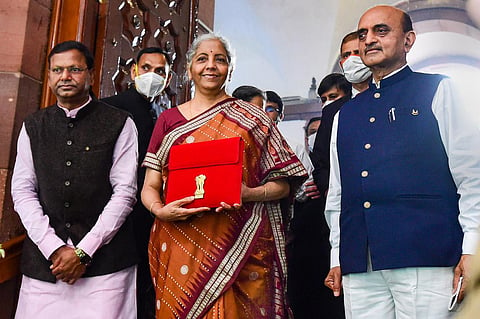

BENGALURU: In the third year of the pandemic, and under the shadow of the Omicron variant, the health budget 2022-23 has come as a deep disappointment for many. The total allocation is only about 0.2 per cent higher than the revised budget of 2021-22.
“The classical demand has always been to increase health allocation to at least 3 per cent of the GDP. In developing countries, it is usually 5 to 6 per cent. For many years, however, it has hovered around 1.3 per cent in India. With the pandemic affecting us, we were hoping this time it would be increased to around 2.5 per cent, but it did not happen,” said Dr Antony K R, paediatrician and public health consultant from Kochi. He said the National Health Mission allocation increased by only Rs 2,800 crore over last year.
Meanwhile, all experts appreciated the National Tele Mental Health Programme, and felt it was the first step towards improving mental health, though they seem divided over rolling out of the National Digital Health Ecosystem.
Dr Giridhara R Babu, epidemiologist and public health expert, said, “The National Digital Health Ecosystem will be useful in ensuring efficient continuity of care. Also, this will entail creating and connecting digital registries (of health providers and health facilities), providing unique health identity and connecting it to universal access to health facilities,” he said.
However, Dr HM Prasanna, president, Private Hospitals and Nursing Homes Association, says, “There is no vision in the budget. The National Digital Health Mission was announced earlier. As Covid-19 is still here, proactive programmes and policies were expected,” he said.
Dr Babu explained that the previous budget had focussed on health and well-being, however, the priority seems to have shifted to Capex for stimulating growth. “The worst is not over; it is time to sustain and enhance resources for redressing health inequities. It is disheartening to see the budgetary allocation has come down by 9.6 per cent.”
Dr Antony opines that the budget should have focussed on regularising health staff who are part of the National Health Mission. “District hospitals need to be strengthened, especially since they became tertiary centres of comprehensive healthcare during the pandemic,” he advised.
Mental health
National Tele Mental Health Programme will be launched for quality counselling with Bengaluru-based National Institute of Mental Health & Neuro Sciences as the nodal centre under which 25 centres across the country will be linked.
This is a welcome move for mental health as there is a shortage of specialists in mental health care and there is a treatment gap for various disorders such as psychosis, anxiety, depression, substance use, etc. Another challenge is that people do not have treatment-seeking behaviour when it comes to mental health issues. All this will be helped by the 24/7 tele-helpline
– Dr Pratima Murthy, director, NIMHANS
Education
As part of universalisation of quality education, One-Class-One-TV channel programme to be expanded to 200 channels, and a digital university wherein high-quality e-content will be delivered through digital teachers.
The establishment of a Digital University and over 200 TV channels covering multiple regional languages are two very innovative and path-breaking initiatives. The development of quality e-content to empower and equip teachers with digital tools for teaching and facilitating in order to achieve better learning outcomes is a welcome measure
– Dr Tristha Ramamurthy, Founder-Managing Director, Ekya Schools, and Provost, CMR University
Crypto assets
Up to 30 per cent taxation on income from sale or acquisition of virtual and digital assets like crypto-currency
By bringing in taxation, the government is legitimising the crypto industry to a large extent. A majority of people, especially corporates, who have been sitting on the sidelines because of uncertainties, will now be able to participate in crypto. Crypto taxation will add to the much-needed recognition of the ecosystem in India and put it in the front seat of innovation
– Nishchal Shetty, founder & chief executive officer, WazirX, India’s first crypto-assets exchange